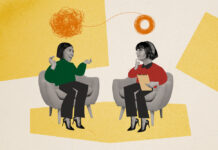The Journal of Humanistic Psychology, which has published high-profile challenges to psychiatric diagnosis, recently republished seminal articles for its 60th-anniversary. The issue aimed to spark renewed scholarship that challenges the current paradigm in psychiatry and clinical psychology as well as research on alternatives to the current paradigm.
The issue features, “The Solving Problems in Everyday Living Model: Toward a Demedicalized, Education-Based Approach to ‘Mental Health,” by Tomi Gomory and colleagues from Florida State University. The Solving Problems in Everyday Living (SPIEL) approach is an educational model of care that would serve as an alternative to the contemporary medical model of mental health treatment. The model was a response to the criticisms of the fifth edition of the Diagnostic and Statistical Manual of Mental Disorders (DSM-V) that occurred around 2013, highlighting the limitations of psychotherapy and the coercive nature of psychiatry. The authors explain:
“We aim to offer practitioners an alternative, noncoercive, nonpatronizing, non-pathologizing, and humanistic approach for conceptualizing distress and distressing behavior, constructing the helping encounter, engaging with clients, and addressing clients’ problems-in-living.”

The DSM has changed over time. More recent iterations have focused on descriptive diagnoses conceptualized as mental disorders. These disorders are most often understood to be medical conditions that could be identified by observable behaviors or reported experiences.
The authors explain that although diagnoses do not appear helpful in the process of change, they became a necessary procedure for helping professionals to receive compensation from the government or insurance companies. This current medical framework has often focused on finding the cause of “abnormal” behavior in the brain or neurological mechanisms. Gomory’s and colleague’s alternative to the medical model stems from the lack of empirical support for this psychiatric framework, as “scientific practice demands that after data falsify a proposed hypothesis through multiple independent tests, newly proposed alternate theories, not yet falsified, should be tested.” Their SPIEL model serves as an alternative model not yet falsified.
From their perspective, the behavior is not caused by biological factors but rather by a complexity of factors, including a person’s history, their experiences in their environment, and the learned behaviors, thoughts, and language developed through the process of socialization.
The SPIEL model works as a model for reeducation. Instead of illnesses, this model understands a person’s troubles to be problems in living that can be addressed by learning new ways of surviving in the world. The authors describe the role of practitioners who use SPIEL:
“The job of the professional, drawing on his or her experiences with life’s travails, understanding of human behavior and development, expertise at interpersonal communication and in the use of rhetoric, is to identify and make explicit the problematic, habituated behavioral patterns, interpersonal style, and strategies of the learner for the learner’s consideration.”
The learning experience ends when the learner’s problems have been resolved or when they no longer find the engagement helpful. SPIEL is considered primarily a learning or educational experience whereby the learner gains new understanding about themselves, others, and their emotional, behavioral, and interpersonal difficulties. Although this is a large part of some psychotherapeutic approaches, the very use of the term psychotherapy places this form of engagement within the medical field.
The proponents of SPIEL were mainly influenced by the commonalities in thought between Karl Popper and Paulo Freire. Paulo Freire was a Brazilian educator and activist who worked alongside disempowered communities. His critical pedagogy invites people to reflect on themselves and their position within our environment and context. By doing so, learners can then act upon their context differently in order to change their current conditions. Putting one’s new knowledge and hypotheses to the test, the learner engages in praxis, taking a primary role in their own liberation and the process of personal and environmental change.
SPIEL, like Freire, also understands the teacher as a person who facilitates a process rather than an expert that assumes a position of power within the process of self-understanding. Instead, the processes are humanized as the learner takes an active role in learning about themselves and the world and finding emancipatory actions and ways of living authentically.
SPIEL was also influenced by Karl Popper, a 20th-century philosopher of science. More specifically, this model takes from his notion of critical feedback, where a person challenges their prejudices, assumptions, and habits to identify possible problematic beliefs and behaviors. This allows the person to change and grow, developing new ways of understanding themselves, others, and the world, opening up the potential for creative ways of being.
Adding another layer, situational analysis invites the scrutiny of others so that the person can further learn about their context where problems occur and reflect on how they have tried to solve these problems. With this new layer of information, the person or group can either use previously successful attempts at solving the problem or create new solutions to unsolved issues.
These concepts are not unlike those utilized in psychosocial interventions such as cognitive-behavioral therapy, interpersonal therapy, and narrative therapy. The authors add that, in fact, feedback is a key component of successful psychotherapy. Yet, to engage in SPIEL more specifically, the following elements are necessary:
- A person–or learner–that voluntarily seeks self-understanding about problems in living that might need an explanation and a solution.
- An empathic professional can elicit and identify problematic patterns and offer possible alternatives for the learner’s consideration.
- The professional must be committed to working with the learner to aid in their full emancipation, placing the learner as a decision-maker and responsible for how the professional encounter is to run.
- The professional must create a safe and confidential emotional, social, and physical environment that can lead to discovering the learner’s problems in living.
- Mutual feedback and correction must be present throughout the work and its outcome. Feedback can then be used to change or improve the relationship and the encounters or change their goals or direction.
The SPIEL model proposes a change in the language around helping professions (such as problems of living, rather than mental illness, or learner rather than the patient) and advocates for empowering and person-centered practices. The presence of these elements within the encounter will facilitate a process of self-understanding that is ultimately noncoercive, and that can lead to the betterment of the person’s suffering by finding solutions to their problems.
****
Gomory, T., Dunleavy, D. J., & Lieber, A. S. (2017). The Solving Problems in Everyday Living Model: Toward a Demedicalized, Education-Based Approach to “Mental Health.” Journal of Humanistic Psychology, 002216781772243. doi:10.1177/0022167817722430 (Link)















And in and within this, we are ALL “learners”. My greatest mistake in life was to
think for one tiny second that a psychiatrist was a collaborator, or at least the tiny bit
curious.
I never ever considered that the doctors were also stunted in growth, perhaps much more
than the client. I never considered that they also come from homes, from parents and from influence
that determines their way of viewing the world and that within that world they might
be unopen to seeing anything beyond a narrow construct.
I think it angers them when the person in front of them is most likely more in touch,
or else they could not possibly have the insight to realize that they have questions.
Psychiatry are just a whole different kind of person, and there are many more that are not that type of
person. In fact the psychiatrist seems to be a loner in this diverse world. Having these dogma that he cannot seem to steer away from, lest his whole ideology plummet.
Bottom line is that the thing that led you to talk to someone will NOT have a meeting or exploring of worlds. It is an impossibility. You being curious results in the shrink believing you asked for help. And this would depend on how unlucky or lucky you get.
Report comment
Sorry but my situation and condition isn’t just a ‘problem with living’ my condition makes my living problematic.
Delusions, hallucinations, mania and paranoia come about yes from traumatic experiences but must be recognized for anyone to be helped or assisted in recovery. Nobody knows yet why the brain reacts in this fashion because of trauma and i have found that i have experienced trauma throughout my life, this has disrupted my day to day living and made it difficult for me to function at times but not all the time.
Thank god there are hospitals and treatment centres because who knows what on earth would happen to someone like me if these places weren’t available. Going to see somebody for a chat is not sufficient i am afraid. Total sanctuary is necessary for someone like me when i have a breakdown and yes i accept this includes my freedom being taken from me and yes treatment given without my consent. I accept all of this and am totally grateful.
Education is the key word but education doesn’t solve the problem. It is only by associating with people like me constantly talking about their experiences and describing what is and remains a phenomenon from the first people who experienced madness to the present day that maybe the problems could be solved. As it is we are walking in the dark and physicians only know that certain medications for certain people do in fact work. Yes some people will find themselves lost but i am happy to say that i personally always pull through thankfully because of good nursing and doctoring. I am always grateful for new ideas to my problems but so far in my lifetime the only ideas that have been helpful have been political and within the benefit system which has helped me tremendously financially here in the UK.
If it wasn’t for hospitals and doctors and nurses then i doubt very much i would have survived or would my son for that matter. I will remain eternally grateful.
Report comment
“Nobody knows yet why the brain reacts in this fashion…” is an untruth. That’s what they want you to think, to keep you in their hospitals and clinics, and keep the insurance money flowing in! But it’s true that it would be unwise to just cancel the whole concept of hospitals for the challenged. They are necessary. It’s just that the ones who currently run them are sold on a story that gives patients all the losses. They think they can’t really help, so they have given up on helping.
“Nobody knows” is a lie. Some do know. But knowing would spoil the games that the liars have so carefully put together to hide the fact that they don’t really want to help anyone.
“…why the brain reacts …” is a lie because we are not actually talking about brains. We are talking about a mind (not a brain) controlled by a being (not a brain). The reason educative therapies are helpful is because they validate that a being IS there who can learn and use what he has learned to improve his condition.
Any therapy that validates Spirit is more workable than one that doesn’t. This doesn’t mean that we need to dispose of “mental hospitals.” It just means we need to take them back from the criminals who are currently running most of them and return control of them to decent people who really want to help.
Report comment
You are ignoring Bippyone’s valid point that trauma needs treatment not just an educational approach. We can have different opinions on the modalities and context for such treatment, but very very few people will recover from trauma just through education and changes in external circumstances. In part because the brains functioning is changed by trauma experiences – and that is a fact. If we ignore the brain, why not ignore the rest of the physical form as well? Obviously this is a ridiculous idea. A whole person view of mental and physical health must include the physical form the ‘being’ lives in, it’s lived history and cultural/environmental contexts.
This is not a statement against a SPIEL model, rather a recognition that it won’t alone fit all requirements for healing and growth.
Report comment
Right and perhaps you never recover. In fact some people have to live with physical pain and chronic conditions that do not respond to treatment. But medicine acknowledges that they do not know.
Although that is getting more problematic since doctors now like to push psych drugs for physical conditions which is just add to the body stress.
Psych pretends that they do know and that they have the meds for it.
Report comment
i will never recover ive told the mht as much but i think like all doctors since the very start of the profession there are very few times a doctor will sit back and do nothing for a patient in distress.
doctors respond to peoples distress and emotional pain is distressing. at one time labotomies and insulin treatment were acceptable procedures to alleviate that distress now meds are the course of treatment. very rarely do i see shock treatment used today here in the UK.
medicine has moved on from leeches and blood letting in the middle ages to tranquillizers in the 21st century. Who knows what the future holds?
As long as the insane are considered to be patients in distress and who are suffering from an illness then people like me will be treated whether that treatment works or not.
Maybe one day in the not too distant future it will be considered insanity is not an illness.
I do not believe i have an illness i do not know what i suffer from i just know what i experience. i become overwhelmed.
something always triggers my insomnia which leads to delusions and paranoia and psychosis, which i believe is all sleep related.
we dont know anything about sleep do we?
when we do we will be getting somewhere.
Report comment
Wow.
You needn’t try so hard, though, to save face for the doctors. They should know better.
Has anyone ever, for example, tried giving you a Locational?
Indeed, it has done the insane no good to consider insanity an illness. And it has not done all the others who couldn’t even be considered insane any good, either.
There is a lot known about sleep. Insomnia is not the easiest thing to treat (at least not in my experience) but pills certainly aren’t the answer there, either.
My teacher tells a funny story about how a doctor observed someone he was helping get overheated in the course of therapy. The doctor wanted to stop the therapy and treat the person for fever! So, yes, they can definitely over-react.
Report comment
For most issues that people run into in life, education (of a non-coercive type) would be the first step to an effective handling.
Even the better therapies I’ve run into are education-based.
Right now we still have the problem that “humanistic psychology” is an oxymoron for most people. Self-contradicting!
I believe this will continue until psychology adopts a more realistic and workable model for human life, and then fixes itself based on that model. Only after that would I, perhaps, give it my “permission” to try to go out and fix the world. Currently it is still trying to reduce us all to animals, to complex biochemical machines. That is not human life! That is not even animal life! Until psychology realizes this and corrects itself, I do not trust it to be my friend.
Report comment
We all may have learnt much that is more or less gratifying or useful and maybe can learn much that is needed or unnecessary. This is welcome for those reasons alone. Every activist needs to undergo a process of development.
However the phrase ‘problems with living’ rather expands the ‘market’ in treatment to include everyone doesn’t it? It has probably done more harm thuswise than any other blurb besides ‘chemical imbalance’. And what if you are somebody else’s ‘problem of living’ , someone with the power to insist on treatment. Yes more trust for the mill of expanding the market in treatment. And isn’t Popper one of the original neo Liberal ideologs? About time we concentrated on the problems inadequate resources confront people afflicted with severe deprivation experience and stop trying to brainwash us into thinking we can overcome inadequacies by the mere power in thought alone!
Report comment
Bippyone.
Well said.
You know yourself, your body and experiences better than anyone 🙂
Report comment
thank you so much Sam Plover
Report comment
You are welcome Bippy.
Report comment